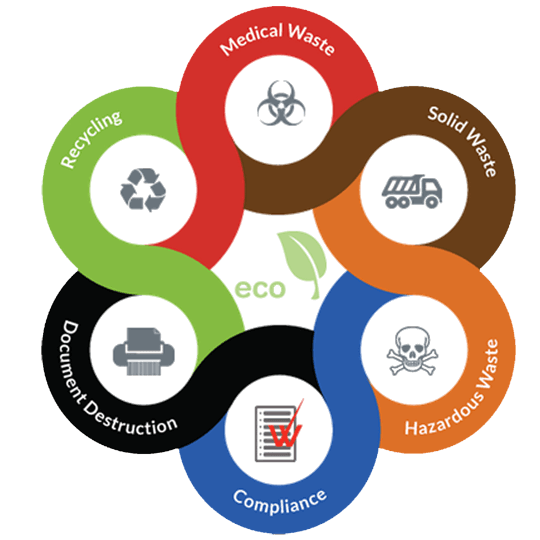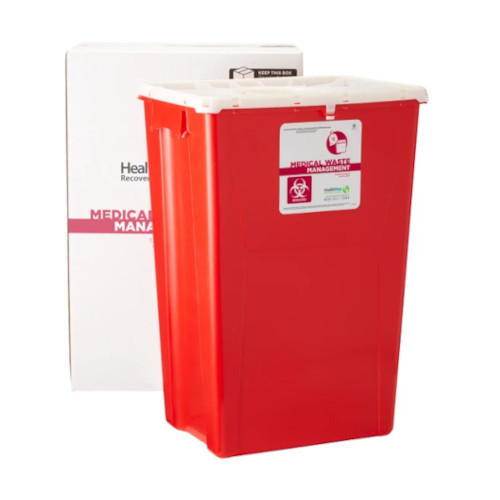Navigating Medical Garbage Disposal: Vital Providers for Medical Care Facilities
In the intricate landscape of medical care procedures, the monitoring of clinical waste is a critical facet that requires precise interest. Healthcare facilities, whether huge hospitals or little centers, are left with the obligation of handling, treating, and disposing of a large selection of medical waste streams. The complexities entailed in browsing with the governing demands, making certain proper waste partition, and performing secure collection and transport procedures are paramount. Understanding the crucial solutions that sustain medical waste disposal is not simply a matter of compliance yet also a basic component in securing public health and environmental health. The ins and outs of this process are vital for medical care centers, and the knowledge supplied in this world plays a pivotal role in keeping the honesty of healthcare systems.
Regulatory Conformity Assistance
For healthcare facilities, making certain regulative compliance support is important to preserve correct handling and disposal of medical waste. By partnering with regulatory conformity specialists, healthcare centers can stay current on progressing regulations, minimize risks associated with improper waste disposal, and inevitably add to a much safer and a lot more sustainable environment for all.
Waste Segregation Support

Medical care centers must provide clear guidelines and training to staff on exactly how to set apart waste properly. This includes dividing basic waste from harmful products such as sharps, infectious waste, pharmaceuticals, and chemical waste.
Collection and Transportation Providers

Correct collection and transport solutions are necessary elements of the clinical waste disposal process in healthcare centers. These services ensure that hazardous materials are dealt with safely and in compliance with guidelines to shield both the setting and public health. Medical care centers rely upon specialized waste management firms to offer reliable collection and transportation solutions customized to their needs.
Clinical waste collection entails setting apart different types of waste at the factor of generation, utilizing color-coded bins or bags to compare general, harmful, pharmaceutical, and other waste streams. Educated workers must perform this task to avoid contamination and make certain proper disposal. When collected, the waste is transported in dedicated vehicles geared up to manage check hazardous materials safely. These lorries comply with strict safety requirements and comply with marked courses to certified treatment centers for disposal via methods such as landfilling, sanitation, or incineration.
Treatment and Disposal Solutions
In the realm of medical waste disposal for health care centers, after the essential phase of collection and transport solutions, the focus moves in the direction of executing efficient treatment and disposal services. Treatment remedies often involve procedures such as autoclaving, which uses vapor under pressure to disinfect the waste.
Disposal services incorporate the final action in the medical waste monitoring process. Reusing and source recuperation are likewise gaining grip as lasting disposal alternatives for specific types of clinical waste materials.
Effective treatment and disposal services are paramount in making sure compliance with laws and securing public wellness and the environment. Medical care centers have to carefully assess and select appropriate techniques that align with their waste administration objectives and sustainability campaigns.
Team Training and Education

To efficiently handle medical waste disposal click here for more in medical care facilities, thorough staff training and education play a vital duty in making sure adherence to regulative demands and keeping a safe setting. Correct training furnishes team with the understanding and abilities needed to deal with various sorts of medical waste, segregate them appropriately, and package them safely for disposal. By educating staff members on the dangers related to inappropriate handling of medical waste, facilities can minimize the possibility of accidents, contamination, and governing infractions.

Verdict
Finally, healthcare facilities count on crucial clinical garbage disposal solutions to ensure governing compliance, appropriate waste partition, secure collection and transport, reliable therapy and disposal, along with team training Discover More and education and learning. These solutions play an essential role in keeping the wellness and safety of both healthcare employees and the public, highlighting the value of appropriate administration of medical waste in healthcare settings.
For healthcare facilities, ensuring regulatory conformity assistance is necessary to keep appropriate handling and disposal of medical waste. Waste segregation entails classifying different types of medical waste to ensure ideal handling, therapy, and disposal. This includes separating general waste from hazardous products such as sharps, contagious waste, pharmaceuticals, and chemical waste.Medical waste collection entails setting apart various types of waste at the point of generation, making use of color-coded bags or bins to differentiate between basic, unsafe, pharmaceutical, and various other waste streams.In the realm of medical waste disposal for healthcare centers, after the critical stage of collection and transport services, the emphasis moves towards applying effective therapy and disposal options.
Comments on “Affordable Medical Waste Disposal Services for Centers and Healthcare facilities”